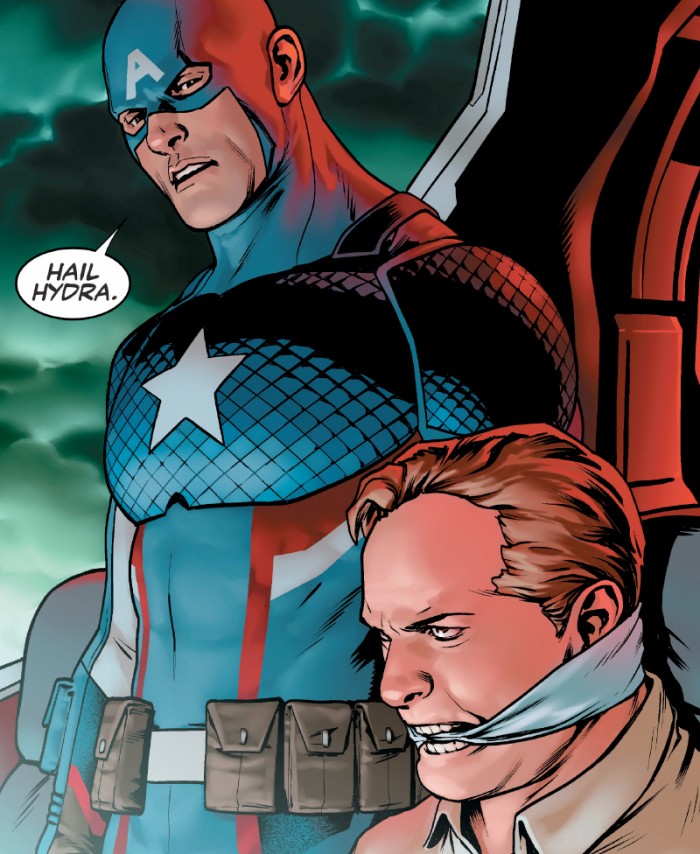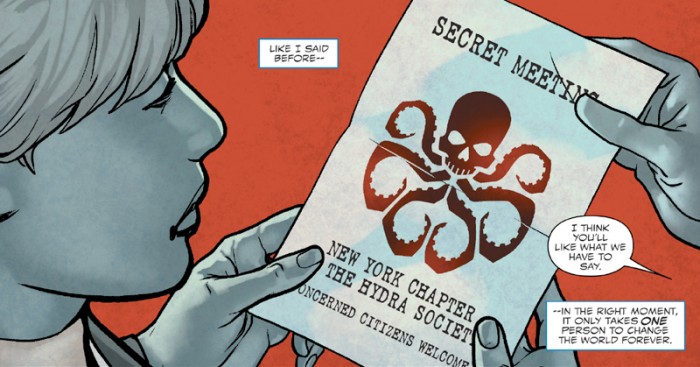The Latest 'Captain America' Comic Is Angering Fans (And They're Almost Certainly Overreacting)
If you think dodging movie and television spoilers is hard, just trying being a comic book fan. The biggest twists from any new comic day (that's every Wednesday) will be in the headlines of every website before noon. It's a problem.
So chances are strong that even non-readers know all about the big revelation that occurred in the final pages of yesterday's Captain America: Steve Rogers #1, the new Marvel series from writer Nick Spencer and artist Jesus Saiz. I'm not going to spoil it in this paragraph, but I will spoil it after the jump as I explain why fans are furious and making their displeasure with this Captain America controversy known on social media...and why they're almost certainly overreacting and will feel awfully silly as this story starts to play out.
Spoilers from here on out.
The bulk of Captain America: Steve Rogers #1 is a fairly standard (and pretty good) Cap comic, following the star-spangled Avenger as he battles the evil forces of Hydra, who have split into two factions fun by Baron Zemo and the Red Skull. Thanks to the malleable power of comic books, Steve recently went from being a de-powered old man to his young self once again due to the powers of a now-sentient Cosmic Cube. Comic books, amiright?
Anyway, Steve is struggling to find his feet as a superhero and he's dealing with a mission that he perceives as a failure because he failed to save a suicide bomber from killing himself and he's humble and noble and everything you'd expect from the character. And then those final pages arrive. In the middle of a mission to rescue an abducted scientist, Cap flings an ally out of a plane, turns to the captive, and declares "Hail Hydra."
Oh, boy.
It's a shocking moment by design. The issue also treats us to various flashbacks to Steve's childhood in 1920s New York City, where his mother is recruited into the Brooklyn chapter of some new group called "Hydra" after one of its members rescues her during an encounter with her abusive husband. The knee-jerk implication here is that the Rogers family have always been Hydra, which means that Steve Rogers himself has always been Hydra, which means that his entire career as Captain America has been a smokescreen. That's ludicrous! That's absurd! That's impossible! That's...kind of the point.
This is the entire hook of Captain America: Steve Rogers and this is what instantly separates it from other Captain America books in recent years. We're supposed to question this. It's supposed to be a shock. We're supposed to stare in disbelief and eagerly await the next issue to figure out what happens next. It has to be a ruse, right? This isn't a twist as much as it is the entire hook of this new series. It's the question that every following issue will try to answer for us.
But many fans didn't see this as a dramatic query that will soon be answered and probably refuted. In fact, the reaction was quite dramatic and quite loud. Although fans were initially outraged for a number of reasons, they all eventually gathered around the same straw man. Here are a few examples, although you'll find countless more with a quick search on social media:
#SayNoToHydraCap because he was created by 2 Jews as a statement against nazism. This warps a beloved character into a villain, & it's gross
— yes homo (@lubelord) May 25, 2016
#SayNoToHydraCap because it's a ridiculous and unnecessary "twist" that is disrespectful to the creator and character. Steve ain't no nazi.
— VeggieQueen🌽 (@PrettyBonesW) May 25, 2016
And it goes on and on. I find this argument deeply irritating because it instantly assumes that Captain America creators Joe Simon and Jack Kirby would disapprove of a wild left turn like this, which is a difficult assumption to make since both of them have been dead for decades. Using the hypothetical opinions of dead men is a poor way to prop up anything. It also ignores that fact that Simon and Kirby previously utilized a similar twist on their own accord. Maybe you should build a time machine and save your outrage for Simon and Kirby themselves, who wrote and pencilled a page where Captain America delivers a Nazi salute to the Red Skull himself (and this was back when the Red Skull was an actual Nazi and not Hydra, which is a different organization altogether, but I digress).
Speaking of time machines, this is the Marvel universe we're talking about here. There are literally an infinite number of science fiction concepts that could have transformed Steve Rogers into a Hydra agent. The woman who recruited his mom could have been a time traveler, sent to alter Captain America's trajectory. The power of the Cosmic Cube may have tampered with Steve's personal make-up. Heck, it could be as simple as Steve pretending to be a secret Hydra plant thanks to his mother's involvement with the group and waiting for the right time to pretend to be a double agent. You just have to fire up your imagination and ponder some possibilities. If you think a company like Marvel would actually, legitimately transform one of its most iconic characters into a villain, you need to take a step back and take a long, hard look at the larger scope of pop culture for more than a few seconds.
To be honest, I have to wonder how many of the outraged fans are either non-comic readers who only know Cap from the movies or relatively new and young readers who haven't quite learned how comic books work yet. For better and worse, this stuff is cyclical. Each new run with a new creative team introduces a new problem, a new question that must be answered, a new wrinkle in an iconic character's make-up. The purpose of a new #1 issue is to bring a character low, to give him something new to surmount. This is basic storytelling. You put a character in a dark place and let them fight their way out. You challenge the reader instead of giving them exactly what they want. This is the difference between stories you remember and fan-service, which feels nice in the moment and then dissipates quickly.
And here's another splash of ice cold reality: no matter what Spencer and Saiz do in their run, Steve Rogers will eventually return to his old self. This is how comic books work. This is how they have always worked. New creators take a character, rough him or her up, make their mark, and then return the character to their natural resting state, so another creator can jump in and do their thing. You don't like this development? You don't like this run? That's okay. Just wait until another creative team takes over. That's how comic fandom has functioned for decades. You vote with what you pick up at the shop, not with death threats.
It's those death threats that irk me the most, because you are a truly unsound person if you think any creative person is worthy of being threatened because you disagree with their storytelling choices. Nick Spencer is one of the smartest guys currently toiling away in the Marvel stable and I sample everything he touches. His Superior Foes of Spider-Man was an instant classic and his current run on Ant-Man deserves all of the praise you can toss at it. His other Captain America series, which follows Sam Wilson (the former Falcon), is solid stuff. If you think he's unaware of exactly what he's doing with this legendary character, you are being foolish. A comic doesn't get written, drawn, inked, colored, and printed unless there's a plan. And transforming Captain America into a Nazi isn't a plan – it's the start of an ongoing story.
Anyway, Captain America: Steve Rogers #1 is a good comic book and Saiz draws the hell out of it and you should consider picking it up. Just remember that it is the first chapter in a story. It's the question mark, not the period.


